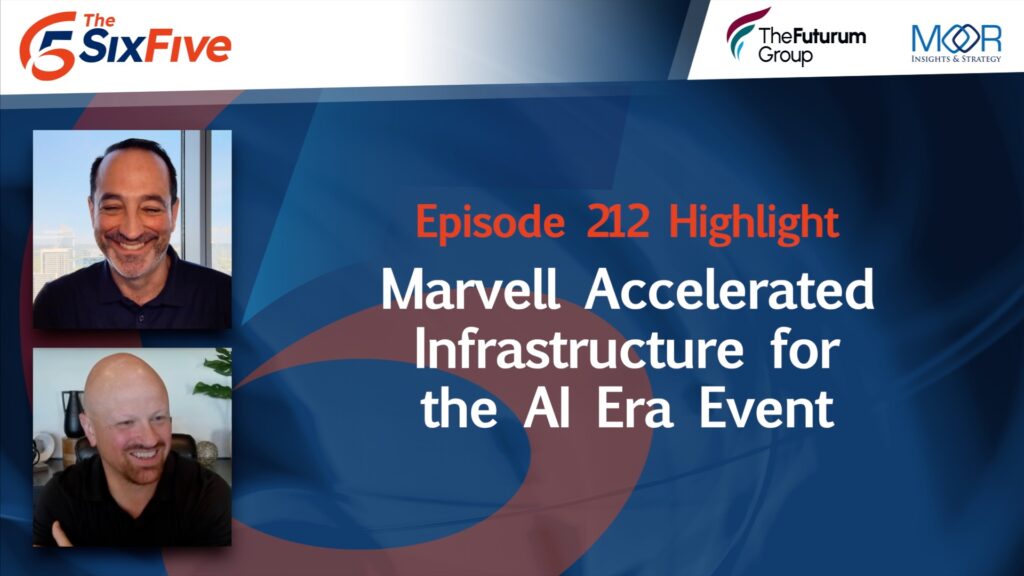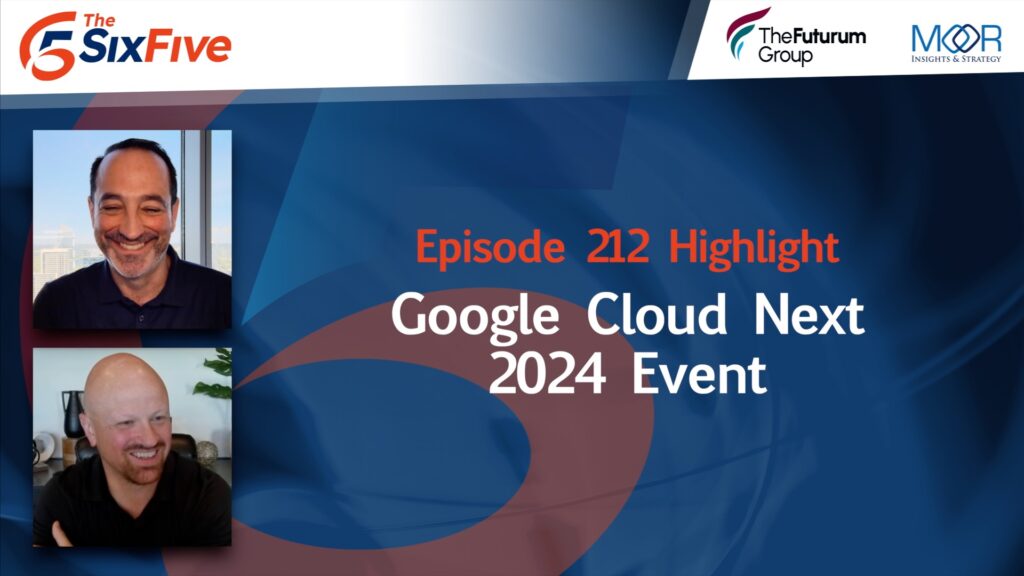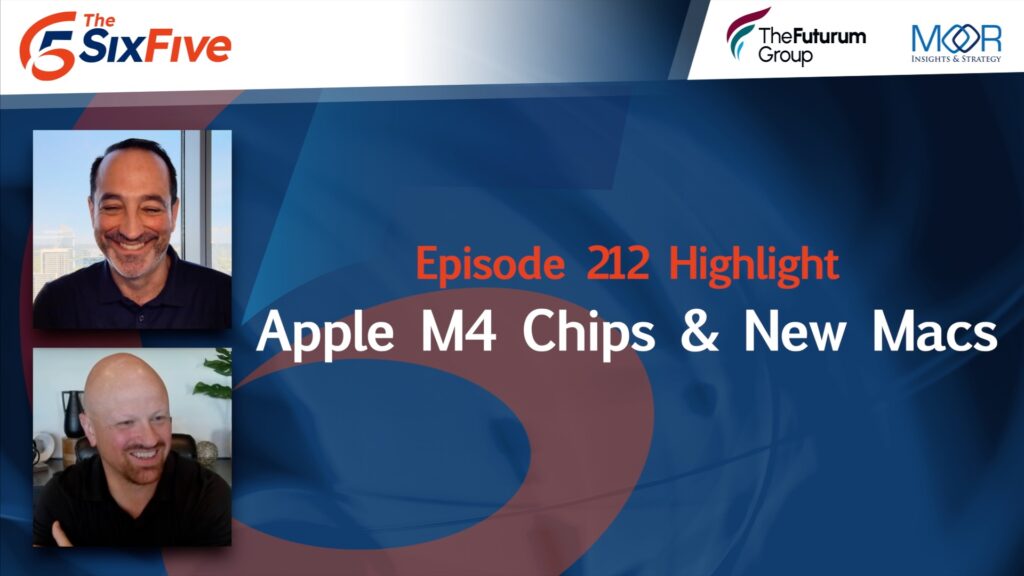On this episode of the Futurum Tech Webcast – Interview Series, sponsored by Intel, I am joined by Nukri Basharuli, Founder and Chief Executive Officer at Aggregion, for a conversation around decentralizing confidential computing, Intel SGX, and what is happening in the industry.
Privacy and Security on the Edge to Cloud Journey with Intel SGX
In our conversation we discussed the following:
- An in depth look into Aggregion and what they do
- How the partnership between Aggregion and Intel sets them apart within the industry
- Aggregion’s confidential computing protocol and what decentralized confidential computing actually looks like
- How data is being protected by confidential computing and the applications that are the most successful
- The main driving factor behind the development of the Aggregion platform
- Why Intel SGX works best for Aggregion
It was a great conversation and one you don’t want to miss. To learn more about Aggregion check out their website here.
Watch my interview with Nukri here:
Or listen to my interview with Nukri on your favorite streaming platform here:
Don’t Miss An Episode – Subscribe Below:
Disclaimer: The Futurum Tech Webcast is for information and entertainment purposes only. Over the course of this webcast, we may talk about companies that are publicly traded and we may even reference that fact and their equity share price, but please do not take anything that we say as a recommendation about what you should do with your investment dollars. We are not investment advisors and we do not ask that you treat us as such.
Transcript:
Daniel Newman: Hey everybody. Welcome back to another edition of the Futurum Tech Webcast. I’m your host, Daniel Newman, principal analyst, founding partner at Futurum Research. Excited to have you here for this Futurum Tech Webcast interview series.
Today, I’m going to be joined by Nukri Basharuli. He’s the founder and chief executive officer of Aggregion. And we’re going to have a conversation about decentralization, confidential computing, Intel SGX, and all things happening related to that and the computing and security industry.
As I always like to start my show, I do get the disclaimers out of the way. So first and foremost, thank you to Intel for being our partner and sponsor on this episode. Second, this show is for information and entertainment purposes only, and while we will be talking to and about publicly traded companies, please do not take anything we say on the show as investment advice.
Now without further ado, Nukri, welcome to the Futurum Tech Webcast.
Nukri Basharuli: Hello, Daniel. Hello from Tbilisi, Republic of Georgia. And a little bit about me, I have PhD in nuclear physics. Now, 15 years ago, I decided to change something and direct in startups last 12 years, I do projects in digital asset management. I had dealt very good partnership with Intel and Microsoft. These companies help us to develop business worldwide, and we have raised funds from investment funds from Israel, New Zealand and Singapore. This is short intro.
Daniel Newman: Absolutely. Well, first of all, an impressive set of credentials to get you to where you are, that degree and that PhD, I bet you, there are some words in that dissertation in the title that I probably couldn’t even pronounce, let alone tell you what they mean. But, always very impressed when you can kind of take that knowledge, because there’s practical knowledge in the real world in application, then of course there’s sort of what I would call academia. And the two things have a ton of overlap, but sometimes they can be their own little universes, but it seems to me like you’ve taken all that education and now you’re applying it into an area by the way, that’s of huge interest on a global scale right now. And so that’s what I want to talk to you about today. So let’s start with Aggregion. It’s not a household name yet, but it sounds like it’s an exciting growth company. Tell us a little bit about it, what the company does and about the partnership with Intel.
Nukri Basharuli: Thank you, Daniel. Our team at region today is 60 experts in decentralized confidential computing technology of distributed data management, machine learning and project implementation in our customers. We are involved in very interesting projects, collaboration projects of corporations. And we are integrated in integration projects between telecommunication companies, banks, insurance companies, and retailers. Currently we help companies to combine this data, combine data, big data, and help to manage auditory over than 100 million customers I see is a fantastic data. And of course it should be protected first of all. This, we name it a project for network economy. We help companies to do partnership based on big data to first of all, to manage this data, to collaborate, analyze this data, but not to lose control, not to compromise this data and protect from data like leakage. Our product are useful for digital marketing data science analysts.
They have ability to manage common data with no risks to lose data control and no data leakage as I mentioned. We were awarded for Microsoft in 2020, we are partner of the year, country partner of the year. And of course everything, what we do is a platform generally based on Intel SGX technology. Technology of confidential computing. We don’t aggregate data. We just help companies to use data, to combine and analyze data, strictly confidential mode. Using region, all data all time is on client site and nevertheless client’s databases. And we help our partners to install our solution in their premises or in their cloud and help companies to collaborate using this data first of all. Our first project came on board two years ago and currently now our technology is growing. Our pipeline is growing every day and fully booked. We are fully this year, the end of this year. And currently we are looking for partners, first of all, in the United States to help us to implement our solutions for American clients.
Daniel Newman: So when you say, decentralized, confidential computing or decentralized, let me just kind of start there. Because confidential computing is starting to get a lot of attention. We’re hearing about it more and more. The hyperscalers are starting to come up with various approaches, the vernacular someone inconsistent. Of course you mentioned Intel SGX is definitely one of the standards in this space, but decentralized you’re really to simplify this for the audience who maybe a little less technical, basically you’re saying that you guys deal with the, A data from a disaggregated standpoint, it can be anywhere and everywhere, and yet you make sure that security has the same benefits of that trusted enclave or that trusted execution where…
Because we always talk about data in flight data at rest and data in motion, right? And, and confidential computing is all about really being able to keep that data protected in motion. Because the other two states, there are a lot of protocols for doing that, right? So I’d like to dive into this whole confidential thing just a little bit further, a bit more of a macro level. What is the kind data that you guys are protecting with confidential computing, what are the applications that tend to work best in the trusted execution environment?
Nukri Basharuli: This is important. First of all, it’s important to explain what, we do at Aggregion yeah? Because we do decentralized confidential computing because generally, when you see confidential computing is a centralized. When companies choose servers, they upload data from one or several partners and they aggregate and manipulate with this data confidential mode, but is important to say why we are decentralized. There are in many tasks where solutions could be solved or otherwise like when you try to collaborate different partners and you don’t know who will be next. Yeah. When pipeline change daily of partners, when the case by case, we see that partnership change collaboration between different partners change, let’s say data sources and you have to protect data from different partners. When you have to protect models and scripts and you have regulatory descriptions. In these cases, you can’t put all data in one database and you have to keep data on owners, premises.
It means this is decentralized confidential computing. And about macro level yeah… I have to maybe mention some cases. I wanted to be clear what we do. When we have projects, when retailers do partnership with CPG pro brands and they’re wanted to combine data for digital marketing and insights, optimize supply chains, this is first case of sometimes retailers are competitors with each other. And from one side, of course they can’t put their data in one data lake.
From another side, brand can help to retailers to promote and to increase sales. Another case when bank with telecommunication company and retailer, they want to increase their models of risk scoring and fraud prevention, and they need target audiences. They need access to this data, but finance organization in let’s say in Europe or in Georgia, as they have restrictions as they, they don’t, they can’t send their data outside of their perimeter. And we see how huge financial groups, develop ecosystems, combines data in super profile of their users. All these, importance is to say that all data processing is carried out on subject to consent of the user and compliance with norms of legalization on personal data. And today we work with structured data like purchase information, user preferences, different models.
And we have pilot projects with unstructured data like video, like images, like audio information from IOT devices. And using Intel SGX, we can develop different scenarios with this collaborative data. We can use machine learning mechanisms. We can develop reports of online to offline sales lift. We can start advertising connected with advertising platforms. This is what we do with data., and we work, first of all, we work absolutely secure. We do. And we help to our clients to run machine learning, to work with any type of data development using Intel SGX and enclaves. Yeah. I hope, I hope I was clear. Sorry.
Daniel Newman: Yeah, yeah. Yeah. So, so let me… You kind of stepped me back and like I said, I was trying to keep up because there’s a lot of things I want to hit you on here. I agree, but you did kind of give me the protocol and then you gave us the overall sort of macro story and then a bunch of the applications that you guys are focused on. I’d love to hear bit about Aggregion though, a bit more about the company, if you don’t mind, what sort of drove this decision I’m hearing that you saw opportunities in compliance, data sovereignty, regulatory, complexity of data, sprawl. I mean, are these the things that drove the business? I mean, what made you decide to go this route, to build this platform?
Nukri Basharuli: As I mentioned before, my previous experience was connected with digital asset management. It was more a familiar data like the, movie, music, electronic books. And mobile technologies, you see, they did gap between right holders and users. I did license processing for content management. It looks like visa, MasterCard, but not for money for rights. And we did successful projects for Disneyland Pearson.
One time I got requests about, can we do something same for data aggregators? And we got that we are close to fast growing market. We successfully sold our previous project and started to develop a new platform for data, let’s say management. I have to say maybe some future reason, but I see that confidential is a basic level for all platforms of new, let’s say paradigm for projects in web three. And I see it’ll be fully decentralized when you wanted to keep your data or manage or analyze your data or… And, I see that all our clients, they need new version of confidentiality. And, you see that optimization of our metaverse project, you will see how data of personal data growing every day. And I see that we need new level of data protection and data transferring and of course, data manipulation. And this is how we came in a Aggregion as a platform of decentralized data management.
Daniel Newman: So, so are you seeing a big opportunity because you alluded to this and I think there’s a lot of speculation out there and there’s also, some people that are not particularly fond of, but the metaverse and web three, it sounds like you’re really building a business that is going to be able to capitalize on, on that trend.
Nukri Basharuli: We go there with our clients. I see how enterprise clients, huge companies are looking, let’s say, new challenges and new ways for their businesses and metaverse today is a trend around. I see how banks and telecommunication companies, they are hiring new people who will let’s say, analyze and develop products in Metaverse for web three. And of course from one side, they have to work with data. They have to, combine their data from private and public. Let’s say clouds from another side, they have to guarantee to their customers, their data is fully protected. And yeah, this is the new trend. And I believe that we will see a new ways, new levels of data collaboration using metaverse projects.
Daniel Newman: Yeah. And, and so much of web three is about decentralizing the data. And so it sounds like you guys are building a platform and a set of protocols and a company that’s going to be well outfitted to deal with the onslaught of enterprise or requests to build these kinds of solutions. Because, there’ll be a period of this will evolve, but as it evolves, companies are going to be building in parallel.
They’re building for the continuous delivery of web two and the current applications that people are consuming, but they’ve got to be investing in building for the future and they need the kind of technology that can manage data and decentralize data, and unchain data and all these different things that are going to be important to keep secure.
So, I’ve been fascinated listening to you. We’re going a little long. So I want to, I want to jump ahead. Intel has been gracious in partnering with us for this episode. I want to talk a little bit about that relationship. They’re one of your primary partners, you were just talking about using SGX for your confidential computing standards. Talk a little bit about the SG Intel relationship, the Intel SGX technology and why you felt that’s the best approach for going forward with confidential computing for Aggregion.
Nukri Basharuli: Yeah, first of all, we are early supporters of Intel SGX technology and I see it was great step for our company to implement Intel SGX as in a first wave. Yeah, because we got super support from Intel. As a result, we are ahead in different markets and we have unique products and of course this is very important for any startup to be fast, to be first, to have strong support from Intel. As I mentioned, the main advantage of Intel SGX or other similar technology is mechanisms. There are some unique mechanisms and is why we have chosen Intel SGX. First of all, this is at a station, to say simpler, this is mechanism to guarantee that all secure participants work confidentially with each other. This is absolutely unique mechanism. And only Intel SGX today, on the market provides this technology.
And thanks to this technology, we can create not only let’s say separate tenants or machines, we can create super secure clusters. We can put any, let’s say type of data, we can analyze huge amount of data. And we do it for our clients just imagine today, daily, we calculate over 100 billion transactions daily using an intelligence technologies. And through this mechanism, at the station mechanism, all participants, including direct competitors, they see that data never leaves their perimeter. This cluster is strictly protected and their scenarios, their scripts, everything is fully protected by Intel technology. And the advantage is the high performance and ability to run any type of application in this enclaves. And Intel helps us to develop this technology to include new type of services for our clients. Intel helps us with architectures, engineers and in business promotion of our products. This is why we work with Intel.
Daniel Newman: So we have about a minute left and I’d love to give you one last, ask you one last question about sort of what’s ahead. So how do you build on this? What do you see as the next… It sounds like it’s still pretty early. Is it all about accelerating adoption here? Is it about bigger projects? Is it about entering new markets? What’s next for Aggregion?
Nukri Basharuli: Next, as I mentioned is to develop partnership, successful partnership program for our clients and partners, because we want to stay first of all as a independent software vendor, but we need a partnership to implement projects because you can, of course you can imagine we work with big clients and we wanted to keep, to be fast and strong on this market. That’s why our next let’s say level is to create strong partnership in the United States and Eastern Europe. Another important step, is to support decentralized and other decentralized projects in different areas like identification projects, like medicine projects, like governmental initiatives, where government is combining their data with private companies and create new possibilities for citizens to use new services, to do life better. This is what we have in our plans. And of course, thanks for Intel for supporting this initiatives of Aggregion’s initiatives.
Daniel Newman: Nukri Basharuli CEO of Aggregion. I want to thank you so much for joining me here on the Futurum Tech Webcast interview series. It’s fascinating to learn about the business. It’s always great to get to other parts of the globe and hear how companies are approaching it. Wishing you the best of luck with the continued growth and development. You’ve got some great partnerships. You’re building on some very interesting and well developed technologies that we at Futurum Research also see as core to the future of growth. So, Nukri thank you so much.
Nukri Basharuli: Thank you, Danielle. Thank you for everything.
Daniel Newman: All right everyone, hit that subscribe button. We appreciate you tuning in to this episode. We hope you will come back. Lots of interviews here on the channel, what a fascinating conversation here today, but for the Futurum Tech Webcast interview series, got to say goodbye. Hope to see you all.
Author Information
Daniel is the CEO of The Futurum Group. Living his life at the intersection of people and technology, Daniel works with the world’s largest technology brands exploring Digital Transformation and how it is influencing the enterprise.
From the leading edge of AI to global technology policy, Daniel makes the connections between business, people and tech that are required for companies to benefit most from their technology investments. Daniel is a top 5 globally ranked industry analyst and his ideas are regularly cited or shared in television appearances by CNBC, Bloomberg, Wall Street Journal and hundreds of other sites around the world.
A 7x Best-Selling Author including his most recent book “Human/Machine.” Daniel is also a Forbes and MarketWatch (Dow Jones) contributor.
An MBA and Former Graduate Adjunct Faculty, Daniel is an Austin Texas transplant after 40 years in Chicago. His speaking takes him around the world each year as he shares his vision of the role technology will play in our future.













